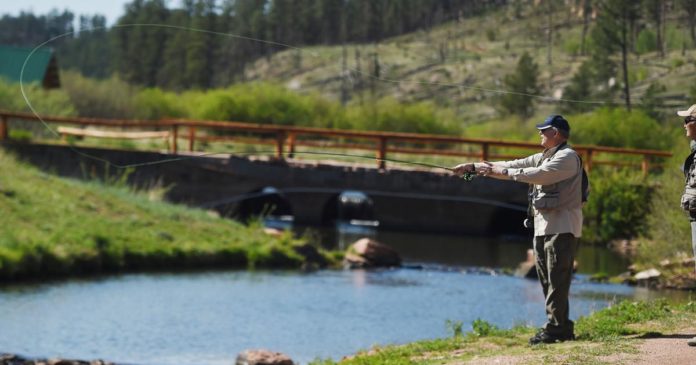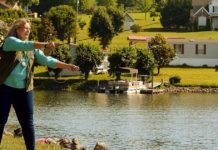TELLER COUNTY • After 20 years in the Army, Chuck Myers retired in 2014.
“They don’t really prepare you,” he says. “They just hand you a bunch of materials and basically say, ‘All right, you’re good to go.’”
Myers was not good to go.
His life was organized by assignments, by precise instructions and goals to be met, until suddenly it wasn’t. He struggled to find purpose in the civilian world. He struggled, too, with memories that refused to be buried in Afghanistan and Iraq. Maybe that’s where he was meant to be, he thought.
“For those first three years out,” Myers says, “if I’d been told, ‘You have a choice to retire or deploy,’ I would say, ‘What time is weapons draw?’”
He learned some valuable lessons those years. One: “You gotta keep going. You can’t sit still and start thinking about too much.”
It was a lesson that brought him here, to a lake tucked among the mountains west of his home in Colorado Springs.
Myers has rod in hand, nothing on his mind but the shiny fish that contemplates the fly he meticulously tied. He watches that bait drift upon the glistening water, watches that Donaldson steelhead drift below, his gaze only broken by the surrounding beauty and bald eagle nest perched high on a pine.
Simple. Peaceful.
This morning, Myers is one of a dozen veterans on a trip with Project Healing Waters. One of the national nonprofit’s biggest, most active programs is based in Colorado Springs — not surprising, considering the organization’s mission paired with the area’s military and fish populations.
Since 2005, Project Healing Waters has been dedicated to the recovery of combat veterans. That recovery is through this rhythmic sport so often associated with zen. A study by Harvard Medical School, for one, found veterans experienced reduced stress and improved sleep after a fly-fishing retreat.
It was a retreat not so unlike this one with Project Healing Waters. Like the group’s fly-tying and rod-building classes, the outing is free to these budding anglers. The outing is one of several scheduled for the year, one that finds itself at a private fishery.
These quieter grounds are preferred, organizer Dan Snelling says. “Some of our folks have problems with real large crowds,” he says.
Some come to the group to overcome physical maladies, but more are like the volunteer over at the grill, preparing lunch. That’s Mike McCleish, who served 21 years in the Army, including special operations in the Middle East.
“You can’t tell what my disability is,” he says. “The thing that burdens me the most is the thing going on between my ears.”
June is National Post-Traumatic Stress Disorder Awareness Month. McCleish is aware of that plague every month, all too aware of fellow service members it claims. On average, 17 veterans commit suicide every day, according to the U.S. Department of Veterans Affairs.
“If I can play a role that prevents one, that’s one that’s not a statistic,” McCleish says.
Project Healing Waters became his mission after retirement in 2018. By volunteering, he decided, he could help connect others to this lifelong passion of his. He could help them “find that same inner quiet and comfort,” he says.
Not all of the volunteers have military backgrounds. There’s Matt VanOrman, for example.
The retired dentist used to practice near Fort Carson, where he heard stories of deployments and casualties. He’s heard stories in his years teaching with Project Healing Waters.
“We had a gentleman that came into one of our classes, and he couldn’t even be in the class. We actually set him out in the hallway, worked with him one-on-one,” VanOrman says. “By the end, he was right in the middle with all the other participants. … We spoke with his mother afterwards. She came to us and said, ‘I didn’t think we were gonna have him by the end of the year.’ She said he would just stay in his room.
“You hear it from time to time, people say this program saves lives. It does.”
It does, leaders say, through the acute concentration required by fly-tying, rod-building and, ultimately, fishing. It’s about finding purpose in all of that.
“It’s about not remembering the things that are causing your problems,” Snelling says.
It’s about the natural surroundings. “Fish don’t live in ugly places,” says another organizer, Andy Koloski.
It’s about camaraderie. Cheers break out when a quiet newcomer lands a trout looking to be 17 inches. His personal best, he reports.
“That’s what we’re all about,” Koloski tells him. “Personal bests.”
But it doesn’t have to be about catching anything. For Myers, the Donaldson steelhead might never bite. He seems content.
Just look around, he says. “You just sit here and go, ‘Wow, this is amazing.’ ”
If you or someone you know is struggling, please reach out to the National Suicide Prevention Lifeline at 800-273-8255 or text TALK (8255) to 741741 at the Crisis Text Line.
Credit: Source link






























